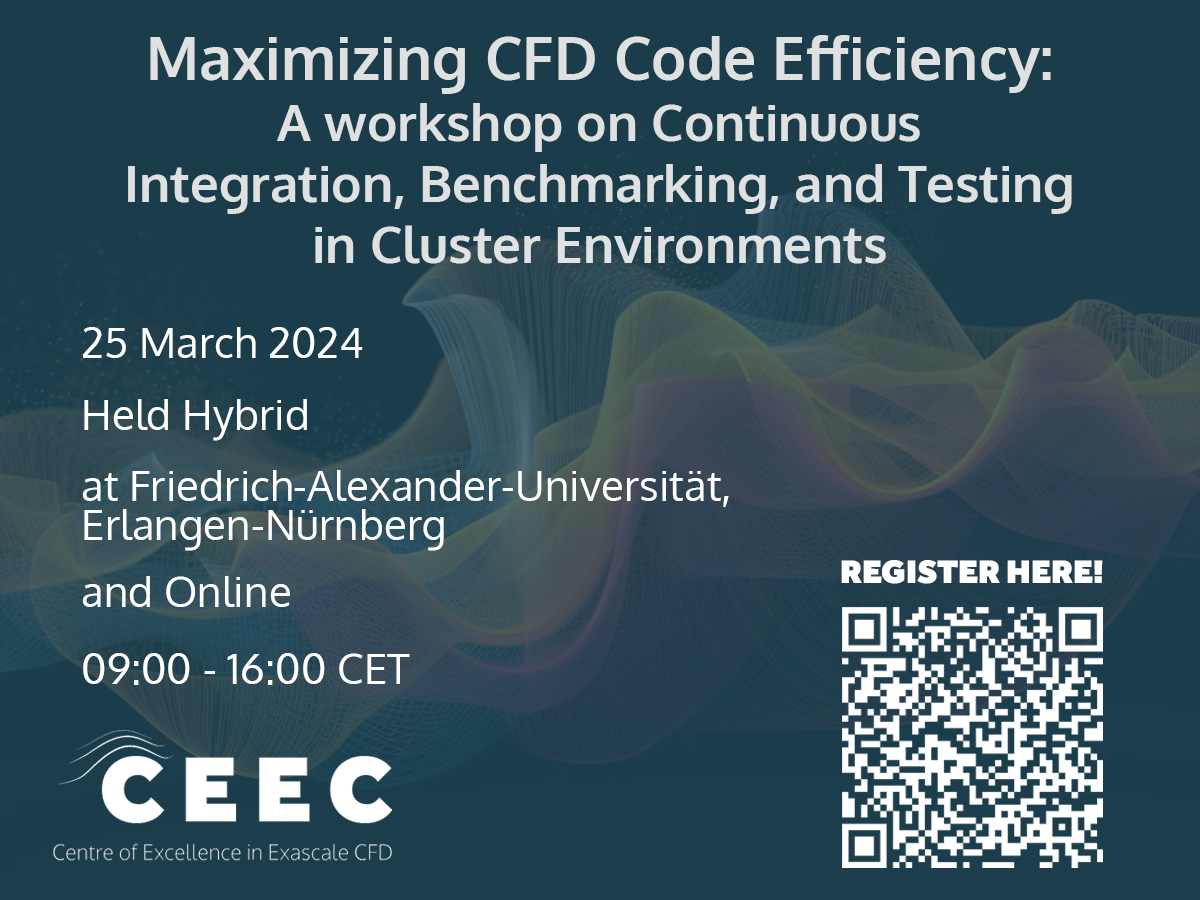Exploring the Ultimate Regime of Turbulent Rayleigh–Bénard Convection through Unprecedented Spectral-Element Simulations
Don’t miss the official presentation of the work on NEKO that is nominated for the Gordon Bell Prize!
Don’t miss the official presentation of the work on NEKO that is nominated for the Gordon Bell Prize!
Join us for our first annual community workshop! The energy consumption constraint for large-scale computing encourages scientists to revise the architecture design of hardware but also applications, algorithms, as well as the underlying working/ storage precision. The main aim is to make the computations energy-efficient (aka sustainable) and robust numerically but also in terms of fault tolerance. On the level of algorithmic solutions, we propose to utilize all provided resources wisely by exhibiting algorithms to computation overlapping but even more communication overlapping strategies. We also promote mixed-precision strategies with the aid of computer arithmetic tools like VerifiCarlo and its variable precision backend. Hence, before lowering precision, one must ensure that the simulation is numerically correct, e.g. by relying on alternative floating-point models/ rounding to pinpoint numerical bugs and to estimate the accuracy. We also work on fault tolerant and resilient algorithms, adaptivity and meshing/ mesh refinement that adapt to the heterogeneous nature of current machines. Another issue discussed in the workshop is the adaptation of adjoint-based topology optimization methods to spectral-element CFD codes. Therefore, in this workshop, we will share our approaches, lessons learnt with preliminary results, and outline perspectives for the upcoming three years of the project.
Recent trends and advancements including more diverse and heterogeneous hardware in High-Performance Computing are challenging scientific software developers in their pursuit of good performance and efficient numerical methods. As a result, the well-known maxim “software outlives hardware” may no longer necessarily hold true, and researchers are today forced to re-factor their codes to leverage these powerful new heterogeneous systems. We present Neko – a portable framework for high-fidelity spectral element flow simulations. Unlike prior works, Neko adopts a modern object-oriented Fortran 2008 approach, allowing multi-tier abstractions of the solver stack and facilitating various hard- ware backends ranging from general-purpose processors, accelerators down to exotic vector processors and Field Programmable Gate Arrays (FPGAs) via Neko’s device abstraction layer. Focusing on Neko’s performance and exascale readiness, we outline the optimisation and algorithmic work necessary to ensure scalability and performance portability across a wide range of platforms. Finally, we present performance measurements on a wide range of accelerated computing platforms, including the EuroHPC pre-exascale systems LUMI and Leonardo, where Neko achieves excellent parallel efficiency for an extreme-scale direct numerical simulation (DNS) of turbulent thermal convection using up to 80% of the entire LUMI supercomputer.
If you’re interested in our progress over the last year or hoping to ask us questions about our plans for the future, don’t miss the chance to talk with our own Niclas Jansson at the first poster session of the Euro HPC Summit on Tuesday, March 19th!
If you’re attending the EuroHPC Summit Week this month in Antwerp, make sure to join our Niclas Jansson for a PLENARY, “EuroHPC Users: How Are They Exploiting the Current EuroHPC Systems & Will Exploit Future Exascale Capabilities?”
17:15→18:45

CI/CD has revolutionized software development practices by offering streamlined workflows that enhance productivity, reliability, and agility in delivering software products. This workshop delves into the adaptation of CI/CD methodologies to HPC environments and aims to equip participants with the knowledge and skills to leverage CI/CD practices effectively on a test cluster and then visualise the results. By the end of the workshop, participants will be equipped with the expertise to implement CI/CD workflows effectively on supercomputers.
The bi-annual Workshop series on Direct and Large Eddy Simulation (DLES) which started in 1994 focuses on modern techniques to simulate turbulent flows based on the partial or full resolution of the instantaneous turbulent flow structure. With the growing capacities of modern computers, this approach has been gaining more and more interest over the years and will undoubtedly be further enhanced and applied. The goal of the bi-annual DLES workshop series is to establish the state-of-the-art of DNS, LES and related techniques for the computation and modelling of turbulent and transitional flows.
We will be presenting interem results from our work at the 12th National Conference on Flow Phenomena in Thessaloniki, Greece. If you’re going to be around (and speak Greek) please come say hello!
In addition to the technical programming, we will be presenting our last year of work at the EuroHPC Joint Undertaking booth J30 on Wednesday afternoon. Come hear about our latest work and then head over to Niclas’ talk on Neko later in the afternoon.
At ISC High-Performance 2024, we present Neko – a portable framework for high-fidelity spectral element flow simulations. Unlike prior work, Neko adopts a modern object-oriented Fortran 2008 approach, allowing multi-tier abstractions of the solver stack and facilitating various hard- ware backends ranging from general-purpose processors, accelerators down to exotic vector processors and Field Programmable Gate Arrays (FPGAs) via Neko’s device abstraction layer. Focusing on Neko’s performance and exascale readiness, we outline the optimisation and algorithmic work necessary to ensure scalability and performance portability across a wide range of platforms. Finally, we present performance measurements on a wide range of accelerated computing platforms, including the EuroHPC pre-exascale systems LUMI and Leonardo, where Neko achieves excellent parallel efficiency for an extreme-scale direct numerical simulation (DNS) of turbulent thermal convection using up to 80% of the entire LUMI supercomputer.